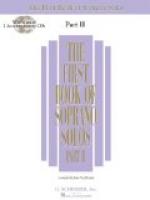“I know He will—if you trust Him!”
“How do you know, Winnie?”
“There is the Scripture, mother. There is the parable of the lost sheep, and then there is another word; ’All we, like sheep, have gone astray; we have turned everyone to his own way; and the Lord hath laid on Him the iniquity of us all.’”
After a moment the weak voice spoke again:
“Winnie, you know Him; will you pray? Tell Him—I’ve taken—my own way,—a ‘witless, worthless lamb!’”
Winifred slipped to her knees beside the bed and prayed; prayed with the greatest thankfulness she had ever known because she knew God, and prayed for the dearest object for which she had made request. She reminded God with great simplicity that He had laid the iniquity of us all who have wandered on His Anointed One, and begged Him to make good the virtue of that act to her poor mother. And the dying lady listened, and believed.
“Dear mother,” said Winifred fondly, “do you not see that He will gather you?”
Mrs. Gray’s head had sunk back contentedly in the pillows. She smiled faintly.
“Yes, I see it now,” she said. “It is very true.”
In a few moments she was asleep, and the nurse resumed her watch. But later in the night a quiet alarm summoned the little household to her chamber, and they watched for the moment of parting between the spirit and its fair tenement. Before it came she opened her eyes, and looked at them placidly. Her lips moved, and Winifred bent forward eagerly to catch their words.
“I—am—not—afraid’” they pronounced, and then closed their witness for this world forever.
The death of Mrs. Gray brought the first great sorrow to the house of Robert Gray. It did its work in the heart of each who remained. It smote the husband with a conviction of misspent years, of a united fellowship in the things that perish so miserably instead of in those things which remain when all else is shaken. Had he but led his gentle wife, as was his opportunity, in ways of the Spirit, how different might have been their record together. And now the end had come for one, with no “abundant entrance,” no glad prospect of long-anticipated joys,
“Where the eye at last beholdeth
What the heart has loved so long,”
but with the negative testimony of a fear relieved—of wrath averted, through the grace of a longsuffering God. They had been guilty together of the capital sin of an earth-centered life; and now the iron merchant, elder of the church though he was, awoke from his long dream of money getting and of earthly comfort to the reality of God, and of his obligation as a redeemed soul to Him. There crept an unfamiliar note of yearning sincerity into the prayers wherewith he took his heretofore formal part in the church prayer meeting, and it almost perceptibly thinned the frozen crust of the “icily regular” service. The men in his business noticed a new softness in his manner, and sometimes it emboldened them to speak to him of their own cares and sorrows, and they found sympathy.




